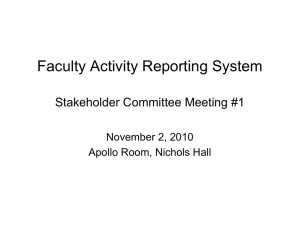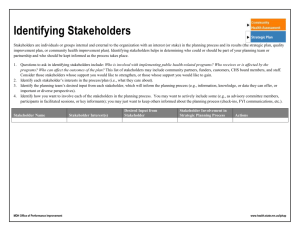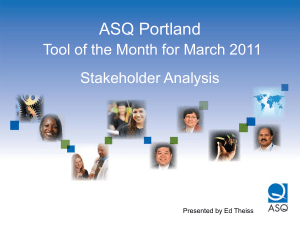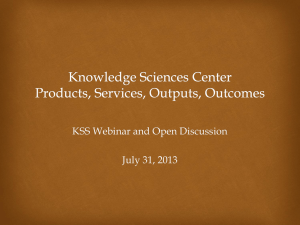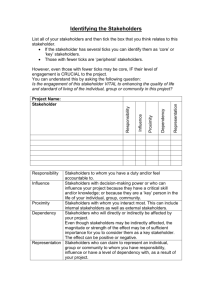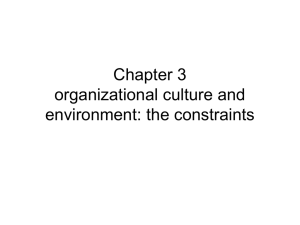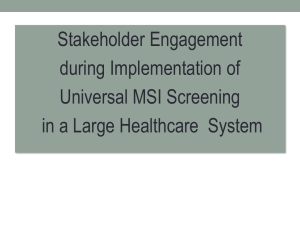03.04 QI-Stakeholder Input
advertisement
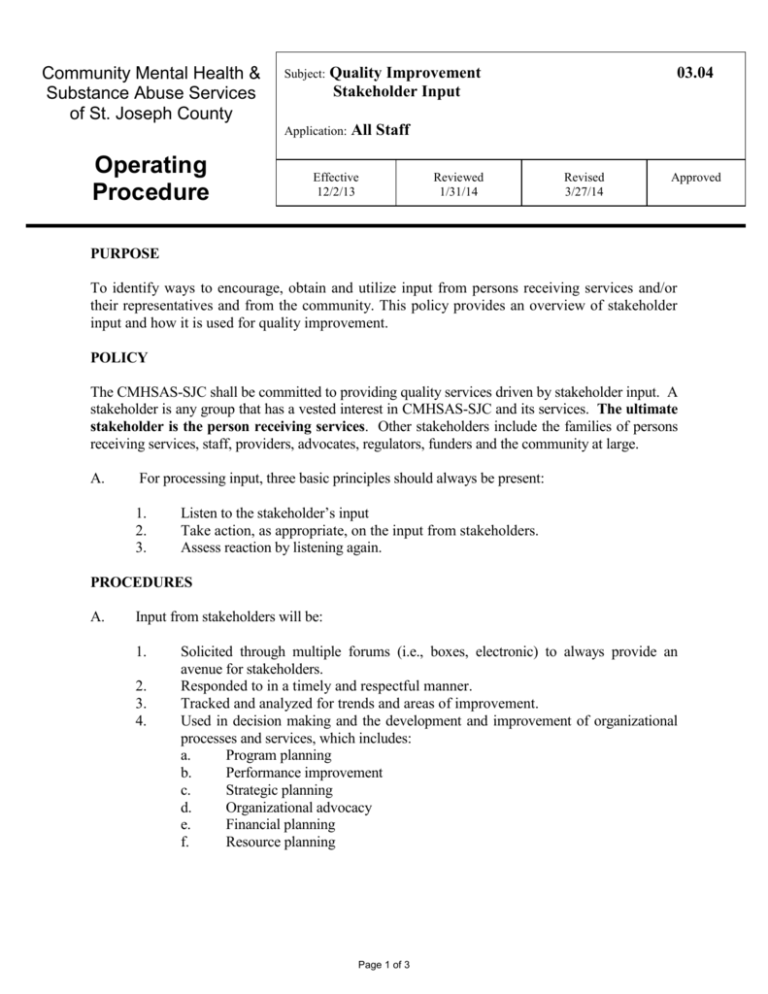
Community Mental Health & Substance Abuse Services of St. Joseph County Subject: Quality Improvement Stakeholder Input Application: Operating Procedure 03.04 All Staff Effective 12/2/13 Reviewed 1/31/14 Revised 3/27/14 Approved PURPOSE To identify ways to encourage, obtain and utilize input from persons receiving services and/or their representatives and from the community. This policy provides an overview of stakeholder input and how it is used for quality improvement. POLICY The CMHSAS-SJC shall be committed to providing quality services driven by stakeholder input. A stakeholder is any group that has a vested interest in CMHSAS-SJC and its services. The ultimate stakeholder is the person receiving services. Other stakeholders include the families of persons receiving services, staff, providers, advocates, regulators, funders and the community at large. A. For processing input, three basic principles should always be present: 1. 2. 3. Listen to the stakeholder’s input Take action, as appropriate, on the input from stakeholders. Assess reaction by listening again. PROCEDURES A. Input from stakeholders will be: 1. 2. 3. 4. Solicited through multiple forums (i.e., boxes, electronic) to always provide an avenue for stakeholders. Responded to in a timely and respectful manner. Tracked and analyzed for trends and areas of improvement. Used in decision making and the development and improvement of organizational processes and services, which includes: a. Program planning b. Performance improvement c. Strategic planning d. Organizational advocacy e. Financial planning f. Resource planning Page 1 of 3 Operating Procedure B. Subject: Quality Improvement Stakeholder Input 03.04 Various mechanisms will be utilized to obtain input from stakeholders: 1. Input from peers, persons served and their families will be obtained through a variety of means that include: a. Establishing formal or informal meetings (i.e., Focus Groups and Consumer Advisory Council). b. Encouraging and promoting representation of families and persons served/peers at all levels, including as members of the Board, focus groups, standing committees and improvement teams. c. Assuring that individual service plans and meetings reflect a person-centered approach. d. Surveying satisfaction of persons served at least once a year from each service area. e. Completing a follow-up survey with a sample of individuals leaving services. f. Supporting advocacy groups of persons served. g. Conducting interviews with persons served and families. h. Tracking access data to determine service needs. 2. Input from advocacy groups will be obtained through a variety of means that include: a. Regular meetings with advocacy groups. b. Advisory and planning committees. c. Review of newsletters. d. Comments at CMHSP Board meetings. 3. Staff input will be obtained through various mechanisms including: a. Staff communications through supervisory channels. b. Participation on unit, department or management meetings, workgroups and/or teams. c. Staff Forums with the Executive Director. d. Staff meetings. e. Staff surveys. f. Performance evaluations. 4. Community input will be obtained through various mechanisms including: a. Community forums/focus groups b. Community Needs Assessments c. Multi-Purpose Collaborative Bodies d. Representation on various committees e. Public Hearings 5. Provider service input will be obtained through a variety of means that include: a. Regular meetings and committees that include contract provide participation b. Provider Orientation and trainings c. Board meetings d. Committees Page 2 of 3 Operating Procedure C. Subject: Quality Improvement Stakeholder Input 03.04 A stakeholder’s standing will not be adversely affected for expressing their opinions or dissatisfaction with a program. REFERENCES - Consumerism Practice Guideline - MDCH Contract on Medicaid Managed Specialty Supports and Services Concurrent 1915(b)/(c) Waiver Program, Attachment P 6.8.2.3 EXHIBITS A. Stakeholder Input Method and Sources Page 3 of 3

